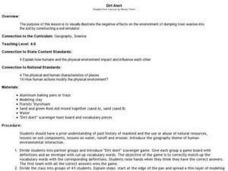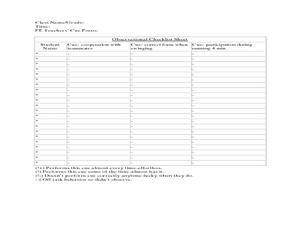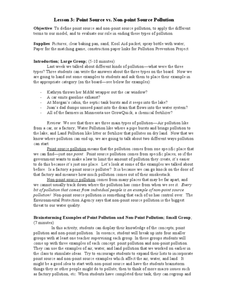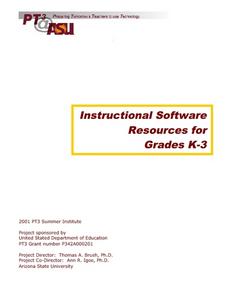Curated OER
Rolling For Value
Young scholars participate in a lesson to comprehend the concept of probability while rolling dice. They recognize patterns while making observations and recording the data for each roll. Students also review place values while playing a...
Curated OER
Dirt Alert
Students explore the environment and effects of pollution. They participate in a "Dirt Alert" scavenger game to study vocabulary words. Students construct a soil simulator to visually illustrate the negative effects on the environment of...
Curated OER
Does the falling tree make a sound if no one if there to hear it? (or communication via encryption)
Learners explore encryption. They discuss the importance of cryptography in our daily lives. Students use games and cryptography to discover transformational geometry and modulo systems. They design their own encryption puzzles and...
Curated OER
Running/Wiffle Ball
Learners explain the basic rules for wiffle ball. In this physical education lesson, students record the steps they took during their 4 mile run. Additionally, learners participate in a game of wiffle ball.
Curated OER
WHAT ANIMALS GIVE US?
Students examine how animals on a farm provide us with many resources.
Curated OER
Dig Into the Dictionary
Second graders explore their vocabulary by participating in a dictionary word find activity. In this vocabulary lesson, 2nd graders locate words in a dictionary based on the beginning letter which must match the teacher's instructions....
Curated OER
Rockin' and Rollin'
Seventh graders, in groups, describe the three major types of rocks through either a song, skit, poem, etc. They present their work to the class during a "rock concert."
Curated OER
Reaction Time 2: Zap!
Students show how skills can improve through practice and awareness, using a reaction-time activity that focuses on both visual and auditory responsiveness.
Curated OER
Migration Isn't Just For The Birds
Fourth graders explore the concepts of conservation using a reading story that describes a flock of geese. The ecosystems are also described in the lesson and the effects of pollution.
Curated OER
Point Source vs. Non-point Source Pollution
Students define and differentiate between point source and non-point source pollution. Students discuss various types of pollution including air, water and land pollution, analyze demonstrations and complete a worksheet.
Curated OER
Instructional Software Resources for Grades K-3
Students become familiar with teh selection, evaluation, and use of instructional software for 4-8 classroom. They download software demos from the web and discuss critiquing software. Students browse software evaluations on web sites.
Curated OER
Pausing to Breathe
Learners identify and summarize the critical aspects of each of the four topics on air pollution. They present these critical components in an interesting and creative manner to class members.
Curated OER
Is Bigger Always Better?
Explore rational numbers with the young mathematicians in your class. They will investigate decimals, fractions, and percents before ordering and comparing rational numbers. This multi-day unit includes differentiation activities and...
Curated OER
Nurture Poetry
Students create a poetry book. In this poetry lesson, students write a cinquain poem, name poem, haiku, limerick, and preposition poem.
Quizlet
Quizlet
Bring your class's study skills into the 21st century with this digital teaching tool. Offering an easy way to create and share customized sets of flash cards with students, parents, and other educators, this resource is a must-have for...
Curated OER
What Can I Do?
Students investigate conflict resolution strategies. In this character education lesson plan, students list things that make them feel sad and are introduced to the conflict resolution strategy "think and share." Students role-play...
Curated OER
Smart Cookie Factors
Learners examine the concept of finding the greatest common factor. They complete number of activities as they practice identifying prime and composite numbers. Pupils apply rules of divisibility and find the greatest common factor while...
Curated OER
Home Living / Daily Living: Safety Terms
Being able to recognize safety signs in your environment is a great start to staying safe. Kids with severe to moderate disabilities work to recognize and identify safety terms and signs. They use flashcards and decreasing prompts to...
Knoxville Art Museum
Lee Walton: Codes in Drawings
Familiar with the systems-based sports drawing of experimental artist Lee Walton? If so, this drawing exercise if for you. Young artists observe an activity over time, develop a coded language for the activity, and then draw a...
Brain Scape
SAT Vocab
Whether preparing for the SAT or just interested in increasing your vocabulary, here's an app that will provide succor to learners desirous of obviating the anxiety associated with the study of esoteric language.
Curated OER
Spelling Bingo
Students write one word in each box on the BINGO card. One student stands and teacher randomly calls out one word from the list to the standing student to spell. If student spells it correctly, the class covers the word on their cards. ...
Curated OER
Baseball Stats
Students explore data sheets and statistics in baseball. They use baseball data available on the Internet to develop an understanding of the different ways in which data can be analyzed.
Curated OER
Musical Note Value
Students will identify each symbol by sight stating the value of each. They will use cardboard notes to who what they have learned so far about the note values creating 4 and 6 count phrases.
Curated OER
Conversation Heart Bingo
Primary learners play conversation heart bingo in order to write common phrases. They will create a bingo card with common phrases from conversation heart candy. The teacher calls out phrases and the learners cover them with conversation...

























